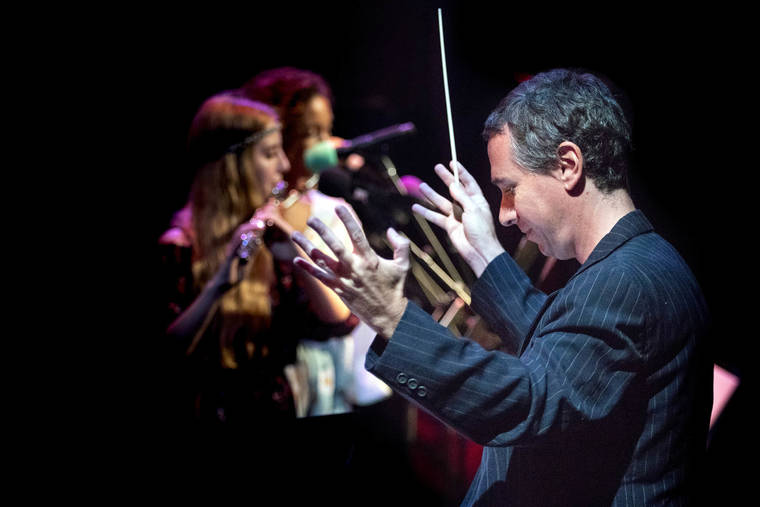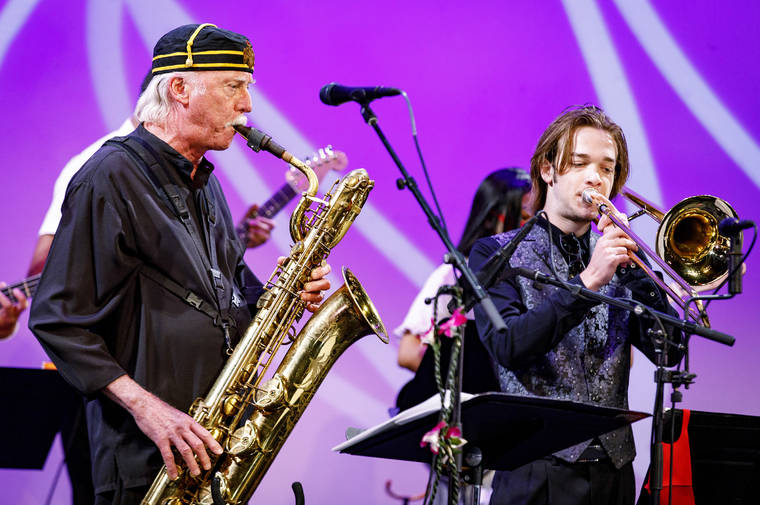Performing arts and music education has changed more than any other school subject as learning went virtual last year. With students returning to the classroom, practicing with classmates is challenging, and upcoming public concerts have been canceled.
I spoke with three of the Big Island’s most respected music educators about what teaching is like during the second year of the pandemic and the challenge to keep music alive in our schools.
After 43 years of teaching music, Gary Washburn remains a Big Island legend. Since 1978, Washburn has brought much attention and accolade to Honoka’a High School’s music programs. In 2011, they were recognized with a National Association of Music Merchandisers Award as one of the best communities in the U.S. for music education. In 2013, Washburn was recognized by the state Senate as “A Living Treasure of Hawaii.” This year, he received the Ellis Marsalis Jr./John LaPorta Jazz Educator of the Year Award.
“Teaching long-distance last year, via Zoom, took the legs right out from under my music program,” noted Washburn. “I couldn’t teach them how to play an instrument, and only about reading music. As a result, I’ve got no students to feed my band with this year. I’m really suffering behind developing anything worthwhile. I lost a few students in the ensemble band, and it looks like our string instrument program is probably going to die after this year.”
Before the pandemic hit, Washburn and his Honoka’a High Jazz Band toured the islands with blues guitarist Johnny Nicholas. Along the
way, the students gained valuable experience playing large halls and intimate clubs.
While live performances aren’t currently possible, Washburn recently recorded a new album with several students called Listen Here. “If I can do one more album, that’ll make 20, and I’ll be satisfied with 20 CDs to represent the school and the kids.”
Luke Clebsch is a multi-instrumentalist and co-founder of Big Island Music Academy, a nonprofit in Kailua-Kona that caters to teaching music to keiki.
“The reason music education matters is that it teaches children how to have good interpersonal skills and how to be able to work together, like in a group or a band,” Clebsch said. “We’ve seen students’ self-confidence grow and their ability to express themselves better in our classes. And this isn’t just like one or two kids. There are just so many valuable life lessons taught with music, like how we need each other and the importance of being part of a community. But the Delta variant has made things pretty challenging. So right now, instead of teaching, we’ve turned into a referral service for private music instruction.”
Trever Veilleux is a music director at the University of Hawaii at Hilo. His annual Frank Zappa class has gained worldwide notoriety, and the ensemble known as the UH-Hilo Jazz Orchestra has performed yearly concerts since 2013, but, as he puts it, the course has been on “COVID hiatus” since the fall of 2020.
“There are more health risks involved with music classes; singing and wind instruments produce a lot of aerosols,” Veilleux explained. “On top of that, our program has received threats of getting cut due to budget reasons for years.”
Veilleux also teaches a high school music class, and when the COVID-19 numbers were low last year, he was able to rehearse the band in a tent, outside, and on campus.
“It was one of the few positive experiences that those high school kids had, to be able to get together, and one of the greatest classes I’ve ever taught because everyone was so appreciative of being able to get together, make noise, make music, you know, we played loud as a rock band,” Veilleux said. “I’ve experienced it for myself, how much music education can provide such a positive, creative outlook for individuals, for students, and certainly for me as an instructor.”
With the challenges and discomfort the pandemic has brought to our schools, on the other side of this, teachers can say they found ways to be innovative to keep music education alive during these unusual times.
Steve Roby is editor of Big Island Music Magazine.





